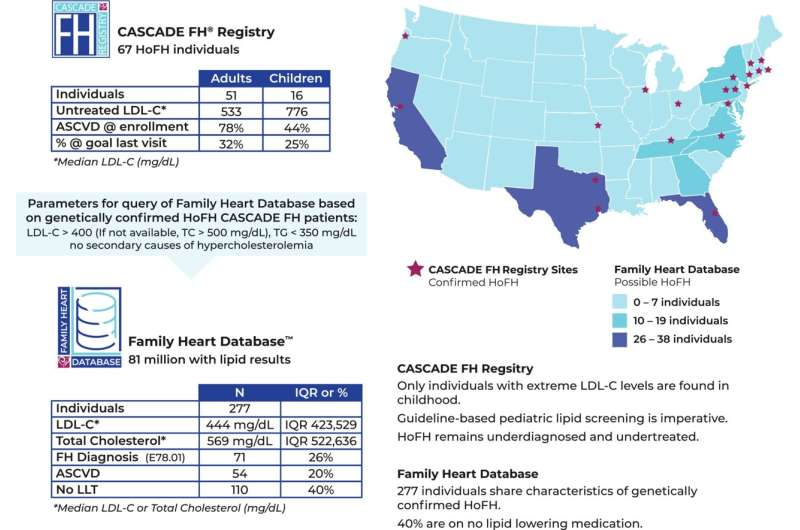This article has been reviewed according to Science X's editorial process and policies. Editors have highlighted the following attributes while ensuring the content's credibility:
fact-checked
peer-reviewed publication
proofread
Study reveals systemic underdiagnosis and undertreatment of homozygous familial hypercholesterolemia

A new study from the Family Heart Foundation shows the diagnosis and treatment of homozygous familial hypercholesterolemia (HoFH) is delayed, and often occurs after a heart attack or early atherosclerotic cardiovascular disease (ASCVD).
HoFH is a rare disease and is the most severe form of the common inherited genetic disorder called familial hypercholesterolemia (FH). HoFH leads to severely elevated low density lipoprotein cholesterol (LDL-C) from birth onward. While some with the highest LDL-C are diagnosed with HoFH in childhood, many others are missed, denying them the opportunity for timely initiation of aggressive lipid-lowering therapies (LLT) and resulting in premature cardiovascular disease.
The new study is published online in the Journal of the American Heart Association (JAHA).
"This Family Heart Foundation study demonstrates missed opportunities for HoFH diagnosis across the lifespan, with many adults in the U.S. still undiagnosed, leading to very real consequences from early heart attacks or strokes," said Mary P. McGowan, M.D., chief medical officer, Family Heart Foundation, and co-author of the study.
"We've found that health care providers often fail to follow the American Academy of Pediatrics and the National Institutes of Health recommendations for pediatric lipid screening, leaving children with HoFH undiagnosed. There is a need for clinicians to screen children and adults appropriately and to take action when LDL-C levels suggest HoFH. People living with HoFH deserve the benefit of all available LDL-C lowering treatments, most of which are underutilized."
The current study, "Contemporary Homozygous Familial Hypercholesterolemia in the United States," is the largest U.S. description of contemporarily treated patients with HoFH. The study examined the HoFH population in two proprietary Family Heart Foundation databases: CASCADE FH Registry and the Family Heart Database.
This comprehensive assessment of HoFH care in both databases indicates that increased lipid screening in childhood and adulthood is necessary to improve diagnosis, and that aggressive use of all available LLTs will be required to improve lipid management in this very high-risk population. Key findings show despite treatment with available therapies, most patients in the Registry still require further LLT to achieve their LDL-C goal and patients in the real-world Database are both underdiagnosed and undertreated.
Insights from the CASCADE FH Registry found that at the time of enrollment into the Registry, 78% of adults and 44% of children with HoFH already had documented ASCVD. Treatment with three to six LLTs in specialty lipid clinics, resulted in overall LDL-C reductions of 72% in adults and 61% in children from their untreated median baselines of 533 and 776 mg/dL, respectively. Despite this dramatic improvement, most had not yet reached recommended LDL-C levels. Because this study was completed prior to the approval of the newest HoFH-specific treatment, future follow-up is needed to reassess LDL-C goal attainment with the addition of this medication.
The analysis from the Family Heart Database of 81 million Americans found 277 individuals with characteristics strongly indicating HoFH, 84% of whom were under the age of 50 and 20% of whom were reported to have ASCVD. Despite a median LDL-C of 444 mg/dL, only 26% had an FH diagnosis. A full 40% were not on any lipid-lowering medications and 19% were on high-intensity statins alone. Less than 20% were on more aggressive therapies needed for adequate LDL-C management in this population. This large database is distinct from the CASCADE FH Registry and includes diagnostic, procedural, and prescription claims data, as well as laboratory information from 2012 to 2021.
More information: Marina Cuchel et al, Contemporary Homozygous Familial Hypercholesterolemia in the United States: Insights From the CASCADE FH Registry, Journal of the American Heart Association (2023). DOI: 10.1161/JAHA.122.029175





















